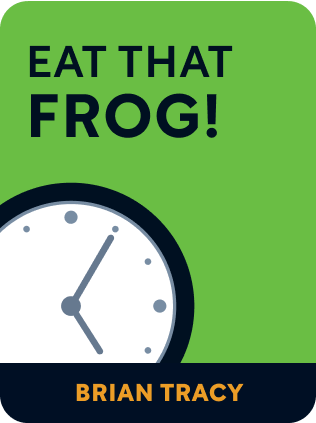

This article is an excerpt from the Shortform book guide to "Eat That Frog!" by Brian Tracy. Shortform has the world's best summaries and analyses of books you should be reading.
Like this article? Sign up for a free trial here .
Do you feel like there isn’t enough time in the day to get everything done? Do you want to use Brian Tracy’s time management exercises to help you become more productive?
The difficult truth is that no matter how much you get done, there will always be more to do, the key is to prioritize. Here are 13 Brian Tracy time management exercises that will help you learn to prioritize, get organized, and overcome limitations.
Keep reading for Brian Tracy time management exercises from Eat That Frog.
Brian Tracy: Time Management Exercises
There isn’t enough time in the day to meet all of the work and personal responsibilities you’re swamped with, let alone keep up with email, social media, and all the things you’ve been meaning to read.
In Eat That Frog, business consultant Brian Tracy says the answer is to identify your most important task—the one with the greatest consequences—and do that first each day. It’s like eating a frog: when you have a big challenge, or frog to eat, it’s best to get it out of the way first; everything after that will be easier by comparison. Based on this insight, Tracy offers a list of practical tips for improved productivity and success.
Below are 13 Brian Tracy time management exercises from Eat That Frog.
Exercise 1: Seizing a Frog
In the first of the Brian Tracy time management exercises, Tracy argues that the key to success is developing the habit of getting your most important task done first.
- Think of a big, important task you have been procrastinating on doing. What effect has your procrastination had on it?
- What would the effect be—on your career, attitude, and feelings—of getting this done quickly and doing it well?
- How can you apply the three steps—decide, discipline yourself, and practice—to get it done tomorrow?
Exercise 2: Put Your Goals in Writing
Before you can identify your most important task and jump into it, you need to know your goals and what actions will contribute the most to reaching them.
- List five things you want to accomplish. To make them more real, write them in the present tense as though you’ve already achieved them (example: I weigh xxx pounds by this date).
- From your list of five goals, pick the one whose achievement would make the biggest difference in your life. Set a deadline for achieving it.
- Make a list of what you would have to do to achieve the goal. Prioritize and organize the list into a plan.
- What step or action can you take each day this week to move toward this goal?
Exercise 3: Make a List
Planning is as simple as making a list of the things you need to do. Create different lists and move items between them—you need a master list, plus monthly, weekly, and daily lists. Spending 10 minutes to plan your day in advance saves up to two hours in wasted time and effort during your day. Using Brian Tracy time management exercises will help you save time in the long run:
- For your job or personal life, make a master to-do list of everything you can think of for the immediate future. Then, as appropriate, move items from your master list to a monthly list.
- Plan your upcoming week by making a weekly list, pulling items from your calendar as well as from your master and monthly lists. How does having a list of tasks for the week make you feel?
- Now, pulling items from your other lists, make a list for the next day of specific items you will complete that day. Organize the tasks by priority.
- Try this process with a project. Think of a work or home project, then make a list of every step required to complete it. Organize the steps by priority and sequence.
Exercise 4: Prioritizing
According to the 80/20 rule, 20% of your effort produces 80% of your results. Focusing on the few most important things will have the greatest impact, yet most people focus on the “trivial many” (the 80%).
- Take a look at your tasks and activities for today or tomorrow. Which tasks are you most inclined to do first and why?
- What are the likely results of these tasks?
- Which few tasks, if you focused on them, could bring the most (80% of) results? How would you feel at the end of the day if you got those things done?
- How would focusing on those few things first change your day?
Exercise 5: Consider the Consequences
Considering the consequences can help you determine your most important task. Tasks with the greatest consequences are the most important; tasks with few consequences are unimportant.
- Look at your to-do list for today or this week (or make a list). What are the long-term consequences of each task on your list? In other words, what impact will each have on the future?
- Which one or two tasks have the greatest potential positive consequences? What are these consequences?
- What steps can you take to start and complete these tasks immediately?
Exercise 6: Procrastinate on Purpose
Most people procrastinate unconsciously and end up putting off the most important things. Instead, you should intentionally procrastinate on things of little importance so you can get the big things done.
- Think about your tasks and responsibilities for today or this week. What small tasks can you put off doing now? Which ones can you eliminate entirely or delegate?
- How did these low-value activities get onto your agenda in the first place? How can you keep tasks like this off your list in the future?
- By abandoning these tasks, what task with significant long-term consequences can you complete today/this week instead?
Exercise 7: Try the ABCDE Method
The ABCDE method is a way of organizing your tasks. “A” is for must-do tasks; “B” is for should-do tasks; “C” is for things it would be nice to do; “D” is for those you can delegate; and “E” for things you can eliminate.
- Go over your current activities and tasks and give each one a label from A to E.
- How many of each designation do you have? What does that tell you?
- What is your top task? How much time have you designated for it and when?
Exercise 8: Your Results
Everyone is hired to produce specific results in a half-dozen or so key areas. You need to know your key areas and expectations because your success depends on delivering these results.
- Identify the key deliverables of your job; grade yourself on each one on a 1-10 scale.
- What is one area or skill that would make the biggest difference in your career if you improved and excelled at it?
- What can you do to continue developing and increasing your abilities in these areas?
Exercise 9: Identify Your Goals
Identifying and focusing on the three most important tasks for your job and the three most important things in your personal life can help you achieve work-life balance and be happier.
- Identify your top three work tasks. If you could do only one thing at work, what would contribute the greatest value to your company and career? What’s the second most important thing and the third.
- In 30 seconds, write down your most important personal goal in each of three areas: career/finances, family/relationships, and health/exercise.
- What plans can you make to focus on your work and personal goals each day?
Exercise 10: Step by Step
The best way to overcome procrastination and make a big job doable is to focus on completing it one step at a time.
- Think of a task or goal you’ve been procrastinating on. Make a list of every step or action you’ll need to take to complete this task.
- Organize the steps in the order they need to be done. What’s your first step? Can you break that step into even smaller steps? Think of slicing a salami into very thin slices.
- What will be the benefits of completing this task? How will you feel upon completion?
Exercise 11: Overcoming Limitations
In every effort, there’s always a major constraint or limiting factor somewhere that hinders your progress on completing your task or achieving your goal. Finding and removing it is crucial to your success.
- Think of a task at work or a goal you’re trying to achieve. List the main factors affecting how quickly you accomplish this task. They could be internal (inside your company), external, or personal.
- What’s the biggest factor—the one whose removal would speed your progress the most? What can you do about it?
- Consider your key life goal or career goal and answer the same questions to identify the biggest factor holding you back.
Exercise 12: Be an Optimist
What you tell yourself about setbacks determines whether they motivate or discourage you. Choose to be an optimist. Respond positively to whatever happens. Optimists are more successful in most areas of life.
- What was the worst or most frustrating thing that happened at work this week? How did it turn out?
- How did you react to it? What did you tell yourself about the situation, and how did this make you feel about it?
- What’s a different message or attitude you could have chosen instead? What lesson can you derive from the situation?
Exercise 13: Sharpen Your Focus
To get anything important done well, you need to focus your attention on it. But often, people’s attention is scattered and interrupted, especially with constant messages and social media.
- Describe your typical morning at work. What do you do first? How many tasks do you start and compete? How often are you interrupted?
- In a typical morning, how often do you check and respond to emails? What if you reduced your checks to only one time—how would that affect the rest of your work?
- Besides minimizing email checks, what else can you do create two 90-minute periods of sustained focus?
These Brian Tracy time Management exercises can help you prioritize which tasks are more important and learn to tackle those first. Use what you learned in Brian Tracy time management exercises daily and watch your productivity rate soar.

———End of Preview———
Like what you just read? Read the rest of the world's best book summary and analysis of Brian Tracy's "Eat That Frog!" at Shortform .
Here's what you'll find in our full Eat That Frog! summary :
- What it means to eat a frog
- How your daily distractions get in the way of doing important work first
- How to make a habit of doing the most important thing first, every day






